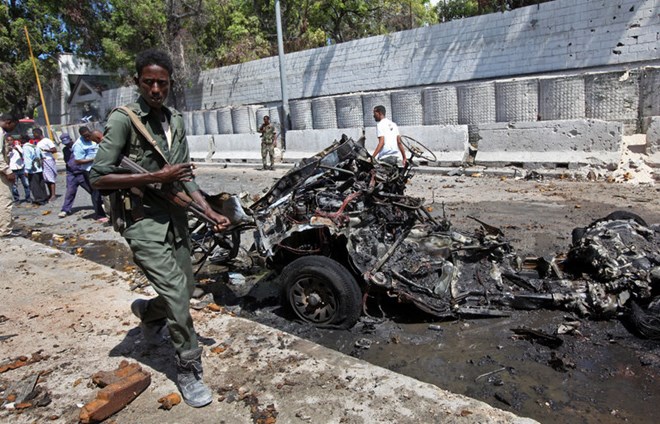
Tuesday May 9, 2017
By HELENE COOPER

A soldier at the scene of a car bombing in Mogadishu, Somalia, in March. The country is at a delicate moment; there are hopes that the new president, Mohamed Abdullahi Mohamed, can bring stability despite drought and famine. Credit Farah Abdi Warsameh/Associated Press
LILONGWE, Malawi — The member of the Navy SEALs who was killed last week in Somalia was moving alongside — not behind, as the Pentagon initially said — Somali security forces approaching a complex inhabited by Shabab militants when the insurgents opened fire, American military officials said on Tuesday.
The SEALs member, Kyle Milliken, a 38-year-old senior chief petty officer, died last week during the mission in support of Somali Army forces fighting the Shabab. Two other Americans, including a Somali-American interpreter, were wounded when they came under fire during the mission around 40 miles west of Mogadishu, the capital.
The Navy SEALs were in Somalia for “an advise, assist and accompany mission,” and Defense Department officials said that Somali forces were to lead the operation, with American forces hanging back.
After the death of Chief Milliken, a member of SEAL Team 6, Pentagon officials had first said that American advisers had stayed behind while Somalis carried out the raid.
A soldier at the scene of a car bombing in Mogadishu, Somalia, in March. The country is at a delicate moment; there are hopes that the new president, Mohamed Abdullahi Mohamed, can bring stability despite drought and famine. Credit Farah Abdi Warsameh/Associated Press
LILONGWE, Malawi — The member of the Navy SEALs who was killed last week in Somalia was moving alongside — not behind, as the Pentagon initially said — Somali security forces approaching a complex inhabited by Shabab militants when the insurgents opened fire, American military officials said on Tuesday.
The SEALs member, Kyle Milliken, a 38-year-old senior chief petty officer, died last week during the mission in support of Somali Army forces fighting the Shabab. Two other Americans, including a Somali-American interpreter, were wounded when they came under fire during the mission around 40 miles west of Mogadishu, the capital.
The Navy SEALs were in Somalia for “an advise, assist and accompany mission,” and Defense Department officials said that Somali forces were to lead the operation, with American forces hanging back.
But Brig. Gen. David J. Furness, the commander of the military’s task force for the Horn of Africa, offered a different account on Tuesday, saying that American and Somali forces were traveling together in a single group when they came under fire. No Somali forces were hit.
General Furness, in an interview at the African Land Forces summit meeting in the Malawi capital, said he did not believe that Americans had been specifically targeted because it was dark and it was unlikely that the assailants were wearing night vision goggles. “We were there on an advise, assist and accompany mission,” General Furness said.
For years, those words have been loaded ones at the Pentagon, where Obama-era guidelines for American forces insisted that United States troops were not technically in combat roles.
While those limitations have been loosened under President Trump, who has given the military more latitude and authority in Somalia, the Americans participating in the raid last week were operating under the old rules of engagement, a defense official said.
Still, General Furness said, with the word “‘accompany,’ it’s tough to judge.” He and other military officials said that American troops would have fallen back before reaching the target area.
In the end, no one reached the area because the mission was aborted after insurgents opened fire on the Americans and Somalis. Pentagon officials said the threat was “neutralized,” but by then, Chief Milliken and two others had been shot.
The group quickly returned to the aircraft that had taken them to the area and was evacuated.
The combat death was another milestone in the United States’ escalating involvement in a war against the Shabab Islamist militants, and it reflects the difficulty of fighting in Somalia, where drought and famine have heightened chaos.
Yet the episode also highlighted a deepening anomaly: The United States Africa Command, which oversees American military operations in Somalia, has yet to act on new authority from Mr. Trump freeing it from Obama-era constraints on strikes against the Shabab. The commando’s death came during a Somali military operation, not an American one.
Trump administration officials have begun questioning why Africa Command, which pushed hard to be relieved of those constraints, has not carried out operations under that new authority.
One reason the military has not carried out new strikes under the increased authority, General Furness said, is that American forces have not developed any new targets. Africa Command’s ability to collect intelligence in the region is stretched, he said, as the military tries to counter the Islamic State in Libya and other militant groups on the continent.
“To target any entity, first you have to find them,” he said. “If you’re using assets in Libya, it’s harder to do Somalia.”
The combat death and the expanded targeting authority come at a delicate moment for Somalia, where there are hopes that the new president, Mohamed Abdullahi Mohamed, can bring stability despite drought and famine.
The American defense secretary, Jim Mattis, is to join European and African counterparts to discuss the situation in Somalia at a conference in London on Thursday.
No comments:
Post a Comment